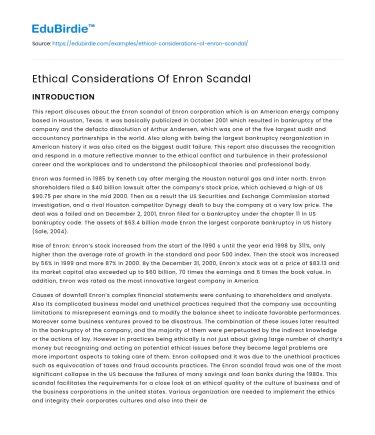Introduction
In the annals of corporate history, the Enron scandal stands as a stark reminder of the catastrophic consequences of unethical business practices. Once a darling of Wall Street, Enron Corporation's dramatic collapse in 2001 not only led to bankruptcy but also unraveled a web of deceit that involved accounting fraud, insider trading, and corporate malfeasance. This scandal serves as a poignant case study for examining the ethical considerations inherent in corporate governance and financial reporting. At the heart of the Enron debacle were decisions driven by greed, lack of accountability, and systemic failures in ethical oversight. This essay seeks to explore the ethical implications of the Enron scandal, discussing how corporate ethics were compromised, the role of regulatory bodies, and the lessons that can be gleaned to prevent future occurrences. By dissecting the ethical failings, this discussion aims to underscore the importance of integrity and transparency in business operations.
Corporate Ethics and Governance Failures
Enron's downfall was precipitated by a series of unethical decisions and governance failures that eroded the trust of stakeholders. At the core of this scandal was the deliberate manipulation of financial statements to present a façade of profitability. Enron employed complex accounting loopholes and special purpose entities (SPEs) to hide debts and inflate profits, a practice that not only misled investors but also violated ethical norms of transparency and honesty. According to Jennings (2003), this deception was not merely a lapse in judgment but a calculated strategy to maintain stock prices and executive bonuses. The complicity of Arthur Andersen, Enron's auditing firm, further exacerbated the governance failures. Instead of providing an independent audit, Andersen’s involvement in shredding documents and failing to question dubious accounting practices demonstrated a severe breach of ethical duty.
Save your time!
We can take care of your essay
- Proper editing and formatting
- Free revision, title page, and bibliography
- Flexible prices and money-back guarantee
The Enron scandal also highlighted the inadequacies in corporate governance structures, which failed to prevent or mitigate such unethical behavior. The board of directors, tasked with the oversight of corporate management, was either unaware or willfully ignorant of the fraudulent activities, indicating a fundamental breakdown in accountability. As noted by Healy and Palepu (2003), effective governance relies not just on adherence to rules but on cultivating an ethical culture that prioritizes stakeholder interests. Enron's executives, driven by short-term gains, neglected ethical considerations, illustrating the dangers of a corporate culture that prioritizes profits over principles.
Regulatory Oversight and Ethical Accountability
The regulatory environment at the time of the Enron scandal played a significant role in enabling the unethical practices that led to the company's collapse. The lack of stringent regulations and oversight mechanisms allowed Enron to exploit financial reporting loopholes with impunity. As Powers et al. (2002) elucidate, the failure of the Securities and Exchange Commission (SEC) to detect and address Enron’s accounting irregularities underscored a systemic weakness in regulatory oversight. The scandal catalyzed significant regulatory reforms, most notably the Sarbanes-Oxley Act of 2002, which aimed to enhance corporate accountability and protect investors from fraudulent financial reporting.
Nevertheless, the introduction of stricter regulations alone cannot ensure ethical compliance. It is essential to foster a corporate environment that values ethical behavior as a cornerstone of business operations. This involves not only implementing robust internal controls and compliance programs but also promoting ethical leadership. As argued by Treviño and Brown (2004), ethical leaders have a profound impact on organizational culture, setting the tone for integrity and ethical decision-making. By modeling ethical behavior and holding all employees accountable, companies can create a culture that discourages unethical practices and encourages transparency and honesty.
Counter-Arguments and Ethical Lessons
While some argue that Enron's downfall was primarily due to systemic regulatory failures, it is crucial to recognize that regulations alone cannot substitute for ethical judgment. Critics may contend that had regulatory bodies been more vigilant, the scandal could have been averted. However, an overreliance on regulatory mechanisms can lead to a checkbox mentality, where compliance is prioritized over ethical considerations. As highlighted by Sison et al. (2012), fostering ethical awareness and moral reasoning within organizations is paramount to preventing misconduct. Enron's case illustrates that ethical decision-making cannot be outsourced to regulators; it must be ingrained in the corporate ethos.
The lessons from Enron extend beyond the need for regulatory reform to encompass the importance of ethical leadership and corporate accountability. Companies must strive to build an ethical culture that aligns with their strategic objectives and stakeholder expectations. This involves not only setting ethical standards but also embedding them into the organizational fabric through continuous training and ethical discourse. By cultivating an environment where ethical considerations are integral to business strategy, companies can safeguard against the temptations of unethical behavior.
Conclusion
The Enron scandal remains a cautionary tale of the perils of unethical business practices and governance failures. It underscores the critical importance of maintaining ethical standards in corporate operations and the need for robust regulatory frameworks to deter misconduct. However, as this essay has argued, ethical compliance cannot be achieved through regulations alone; it requires a concerted effort to foster an ethical culture within organizations. By prioritizing transparency, accountability, and ethical leadership, companies can learn from Enron's mistakes and build a sustainable business model that serves the interests of all stakeholders. Ultimately, the ethical lessons from Enron remind us that integrity and trust are the bedrock of corporate success and longevity.






 Stuck on your essay?
Stuck on your essay?

